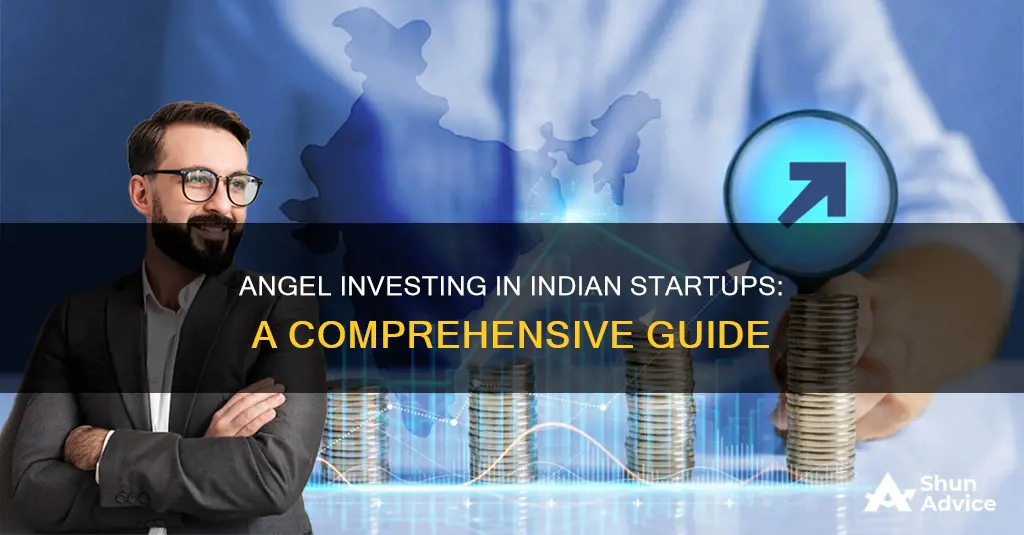
India is currently the world's third-largest startup ecosystem, with angel investors playing a crucial role in bolstering and scaling this growth. Angel investors in India have proven their worth by identifying and capitalising on new opportunities, particularly in seed-stage investments. The country currently has over 125 angel networks and syndicates, a number projected to rise to 200 by 2030. These networks offer a platform for new and existing investors, providing essential support to early-stage startups, from fundraising to operational expertise. They also enable entrepreneurs to tap into the expertise of seasoned investors, gain market insights, and form valuable partnerships. This guide will explore the strategies and avenues for angel investing in Indian startups, including the prominent networks and platforms that facilitate these investments, to help you navigate this thriving landscape and make informed decisions.
| Characteristics | Values |
|---|---|
| Investment Types | Equity Financing, Debt Financing, Grants, Angel Investment, Venture Capital |
| Investor Profile | Friends, Family, High-Net-Worth Individuals (HNIs), Venture Capitalists, Debt Funds, Private Equity Firms |
| Investment Risk | High Risk, High Reward |
| Investor Criteria | Minimum INR 2 crore net worth, experience in early-stage investing, serial entrepreneurship, or senior management |
| Platforms | AngelList India, Indian Angel Network |
What You'll Learn

Understanding the Indian startup ecosystem
The Indian startup ecosystem has witnessed a remarkable transformation in recent years, evolving from a minor player on the global stage to the world's third-largest startup hub, only trailing the US and China. This growth has been fuelled by a combination of factors, including the country's vast population, a thriving community of talented entrepreneurs, and a supportive government. These factors have created a favourable environment for startups to thrive and have attracted significant attention from global and domestic investors.
Key characteristics of the Indian startup ecosystem:
- Entrepreneurial spirit: India's large and youthful population has fostered a culture of innovation and entrepreneurship. Young Indians are increasingly embracing the startup trend, venturing into diverse sectors with creative business ideas.
- Government support: The Indian government has played a pivotal role in fostering the growth of startups through various initiatives. Schemes such as the Startup India Seed Fund Scheme, SIDBI Fund of Funds, and Credit Guarantee Scheme for Startups provide financial support, promote private investments, and facilitate access to collateral-free debt for aspiring entrepreneurs.
- Funding landscape: India's startup funding landscape is diverse, with multiple sources of funding available. These include angel investors, venture capital firms, debt financing from financial institutions, and grants from government and private organisations. Angel investors, often high-net-worth individuals, play a crucial role in providing seed capital to startups in their earliest stages.
- Risk and reward: Investing in Indian startups carries a high level of risk due to the inherent failure rate of early-stage ventures. However, it also offers the potential for substantial rewards. Investors must carefully evaluate the risks and returns before committing their capital.
- High growth potential: Startups in India often focus on innovative solutions to specific problems or addressing gaps in the market, providing them with high growth potential. This attracts investors seeking significant returns on their investments.
- Diversification: Investing in Indian startups offers an opportunity for investors to diversify their portfolios beyond traditional asset classes. It allows them to explore sectors such as e-commerce, fintech, edtech, healthtech, and agritech, among others.
- Tax benefits: The Indian government provides tax incentives for investments in startups, including exemptions on capital gains tax, making startup investing a lucrative option for affluent individuals looking to expand their investment portfolios.
In conclusion, the Indian startup ecosystem is dynamic and thriving, presenting numerous opportunities for investors. However, it is essential for investors to thoroughly research and evaluate startups before committing their capital due to the inherent risks associated with early-stage ventures.
Vanguard Value Index Portfolio: What's Inside?
You may want to see also

The risks and rewards of angel investing
Angel investing in India has seen significant growth in the past decade, with the market estimated at $4 billion in 2022. Angel investors provide capital to startups in exchange for equity ownership and often play a crucial role in enabling early-stage entrepreneurship. While angel investing offers several potential benefits, it also carries certain risks that investors should carefully consider.
Rewards
- Portfolio Diversification: Angel investing allows investors to diversify their portfolio beyond traditional asset classes like stocks and bonds. It provides an opportunity to invest in startups across different sectors, business models, and founders, thereby spreading out the risk.
- High Return Potential: Although investing in startups is high-risk, angel investors can potentially achieve enormous returns. Successful exits can result in 10x or even 100x returns on their investment.
- Mentoring Opportunity: Angel investors often enjoy the opportunity to mentor and advise startup founders, sharing their expertise and networks to help them succeed.
- Early Access to Deals: Angels often gain early access to the best new deals through their networks and startup events, allowing them to invest in promising startups before venture capital firms.
Risks
- High Failure Rate: Startups have a high failure rate, with research suggesting that 9 out of 10 startups may fail due to various reasons such as lack of funding, competition, poor management, or lack of market need. Angel investors need to be prepared for potential losses and aim for a few successful exits to make up for multiple failures.
- Illiquid Investment: Angel investing typically locks up capital for extended periods, often 5-10 years, before any exit is possible. The illiquid nature of the investment can make it challenging for angels to access their money when needed.
- Potential Loss of Investment: In the event of a startup failure, angels may lose their entire investment or face significant losses. This is a risk distinct from other asset classes, where the loss may be limited to a portion of the invested amount.
Angel investing in Indian startups offers both rewards and risks. Investors should carefully evaluate startups before investing, considering factors such as the team, product-market fit, traction, addressable market, growth strategies, and financial projections. Additionally, joining angel networks can provide access to deal flow, due diligence support, co-investment opportunities, and knowledge sharing.
Portfolio Investments: Global Politics' Impact
You may want to see also

How to become an angel investor
An angel investor is an individual or company that provides financial support to early-stage startups in exchange for equity ownership or a portion of revenue. Angel investors are also known as seed investors, business angels, informal investors, angel funders, private investors, or startup investors.
Who can become an angel investor?
In India, the Securities and Exchange Board (SEBI) has set up a list of eligibility criteria concerning the minimum net asset value and related requirements. To qualify as an angel investor, you must meet one of the following requirements:
- An individual investor with net tangible assets of at least INR 2 crore, excluding the value of the investor's principal residence. The investor must also have early-stage investment experience or experience as a serial entrepreneur or senior management professional with at least 10 years of experience.
- A corporate body with a net worth of at least INR 10 crore.
- An Alternative Investment Fund (AIF) registered under SEBI AIF Regulations, 2012, or a Venture Capital Fund (VCF) registered under the SEBI (Venture Capital Funds) Regulations, 1996.
Steps to become an angel investor:
If you meet the eligibility criteria and want to become an angel investor, here are some steps to guide you through the process:
- Understand how angel investing works: Research and understand the basics of angel investing, including the role of angel investors in supporting startups, the different types of investments, and the potential risks involved.
- Network with industry experts: Attend workshops, seminars, and investor masterclasses conducted by leading Indian angel network incubators and angel groups. Network with existing investors to discuss and gain a clear understanding of the field. Building these connections will also help you expand your angel network for future investments.
- Join an angel group or incubator: Consider joining groups such as the Indian Angel Network, incubators, funds, and other angel networks. These networks provide access to a community of like-minded individuals and experienced professionals, including entrepreneurs, financial experts, and angel investors. Their combined knowledge and mentorship will help you navigate the challenges of angel investing and increase your chances of success.
- Develop an investment strategy: Define your investment criteria and strategy, including the industries, sectors, or projects that interest you, your preferred amount and tenure for investments, and whether you prefer lump-sum or staggered investments.
- Find and evaluate potential investments: Startups looking for angel investors can be overwhelming, so take advantage of the curated investment opportunities provided by angel groups and incubators. Evaluate the potential risks and choose a valuation method that aligns with your investment goals. Consider the growth potential, business plan, risks involved, and fair company valuation of each startup you consider investing in.
- Make your first investment: Once you have gained the necessary knowledge, built a network, and identified potential investment opportunities, take the leap and make your first investment. Track your investment regularly to assess its success and make any necessary adjustments to your strategy.
Key considerations:
- Risk assessment: Angel investing is a high-risk venture, and it is important to carefully analyse and understand the risks involved before making any investments.
- Diversification: Angel investing is a great way to diversify your investment portfolio beyond traditional bonds and stocks. However, experts recommend that high-risk alternative investments like angel investing should not exceed 5% of your total portfolio.
- Mentorship: Mentorship is an integral part of angel investing. Besides providing financial support, angel investors often guide and mentor startup leaders, helping them navigate strategic business decisions and providing valuable networking connections.
Global Macro Strategy: Investment Management Explained
You may want to see also

Due diligence and the investment process
- Understanding the startup's idea and business model: It is essential to thoroughly comprehend the startup's concept, business model, and growth strategy. Assess whether the idea is unique, viable, and scalable.
- Evaluating the founders: Look beyond the pitch and assess the founders' background, experience, vision, passion, commitment, and leadership skills. The quality of the founding team is a critical factor in the success of a startup.
- Analysing the target market: Evaluate the size, potential, and competition within the startup's target market. Ensure that the startup has a clear value proposition and a loyal customer base or, at the very least, a strong potential for customer acquisition.
- Competitor analysis: Identify existing and emerging competitors in the same domain. Understand their strengths, weaknesses, and strategies to gauge the startup's ability to differentiate itself and compete effectively.
- Valuation and financial assessment: Conduct a thorough valuation of the startup based on its revenue, growth, traction, and future prospects. Additionally, assess the financial health of the startup, including cash flow, investments required, key milestones, break-even points, and growth rates.
- Risk assessment: Acknowledge the inherent risks associated with investing in startups, including the high failure rate and liquidity risk. Diversify your investment portfolio and only invest an amount you are comfortable losing.
- Due diligence by investors: Angel investors or venture capital firms will conduct their due diligence on the startup. They will evaluate the startup's financial decisions, team credentials, and background. This process helps verify the startup's claims and growth trajectory and ensures that any potential red flags are identified.
- Term sheet and investment structure: A term sheet summarises the key points of the deal, including valuation, investment structure (equity, debt, or a combination), management structure, and changes to share capital. Carefully review and negotiate the terms to ensure they align with your expectations and goals.
- Exit strategy: Consider the potential exit options, such as mergers and acquisitions, initial public offerings (IPO), or selling equity to other investors. Understand the timeline and conditions under which you can exit your investment and realise returns.
- Regulatory and compliance considerations: Stay informed about regulatory requirements and compliance norms in India, especially those specific to startups. Ensure that the startup you are investing in complies with all necessary legal and regulatory frameworks.
- Network and seek advice: Utilise platforms like AngelList India and Indian Angel Network to connect with other investors and seek advice. These platforms can provide access to top deals, syndicates, and mentorship from experienced investors.
Remember, due diligence is an ongoing process, and it is crucial to remain engaged and informed throughout your investment journey. Conduct thorough research, seek professional advice when needed, and carefully assess all factors before making any investment decisions.
Indexing vs Active Management: Why Indexing Wins
You may want to see also

Exit options and realising returns
- Exit Events: Angel investors typically realise their returns through exit events such as mergers and acquisitions or an Initial Public Offering (IPO). During an exit event, investors may sell their equity or shares to other venture capital or private equity firms. The founders of the startup may also buy back their shares from the investors if they have the liquid assets to do so.
- Timeframe: It's important to note that startup investments generally have a long holding period, often averaging 7-8 years. This long-holding period is due to the nature of startups, which require time to mature and scale their operations. Therefore, angel investing is an illiquid investment option and may not be suitable for investors who need quick access to their funds.
- Risk and Reward: Angel investing in startups carries a high level of risk. Startups have a high failure rate, and investors may lose their investment if the company goes defunct. However, the potential rewards are also high. Catching the right startup early on can lead to exponential growth in the investment over a few years.
- Diversification: To mitigate the risk, investors should consider diversifying their portfolio by investing in multiple startups across different sectors and stages of development. This diversification can help spread the risk and increase the chances of successful exits.
- Due Diligence: Conducting thorough due diligence is crucial before investing in a startup. Investors should assess the startup's business model, market potential, and management team. Evaluating the founders' background, experience, and vision is essential, as they play a crucial role in the company's success.
- Exit Strategy: When negotiating the investment, angel investors should discuss potential exit options with the startup founders. A well-performing, high-growth startup with excellent management and organisational processes is more likely to be exit-ready earlier than other startups. Understanding the exit strategy from the outset can help manage expectations and ensure a successful realisation of returns.
Hedge Fund Managers: Investment Bankers or Something Different?
You may want to see also
Frequently asked questions
A traditional company scales at a linear rate through organic growth tactics and is generally profitable from day one. On the other hand, a startup grows at a fast rate with the help of large amounts of capital and resources and may not be profitable until a few years into operation.
The three primary types of funding are equity financing, debt financing, and grants. Equity financing involves exchanging capital for a fraction of the company's equity. Debt financing involves borrowing funds from an individual or organisation, with the promise to repay the principal amount plus interest. Grants are non-repayable financial rewards offered to a startup to help it achieve growth.
Startups are inherently risky ventures with a high failure rate. There is a high risk of losing your investment if the startup fails. Other risks include liquidity risk, regulatory risk, and lack of information due to startups not being required to disclose financial information.
Investing in a startup offers the potential for high growth and returns. It provides an early entry advantage, allowing investors to gain a larger ownership stake at lower valuations. Startup investing also offers diversification benefits and tax incentives in India.
To invest in Indian startups, you need to meet certain criteria, such as having a minimum net worth and experience in early-stage investing or entrepreneurship. You can connect with startups through dedicated platforms like AngelList India, Indian Angel Network, and Startup India Investor Connect. These platforms offer access to top deals, syndicates, and advice from experienced investors.







